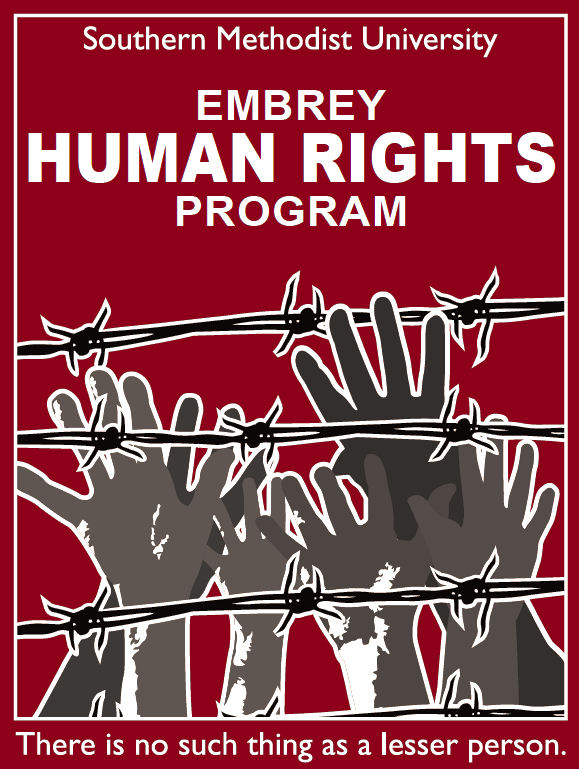SMU human rights major is first in the South and 5th in the U.S.
SMU becomes the first university in the South, and only the fifth in the country, to offer a major in human rights.

DALLAS (SMU) — SMU is the first university in the South, and only the fifth in the country, to offer an academic major in human rights. Approved Sept. 9 by SMU’s Board of Trustees, the Bachelor of Arts in human rights degree comes five years after creation of the Embrey Human Rights Program at SMU.
 Rick Halperin Hear KERA interview  |
The undergraduate degree program officially begins in spring 2012 but most SMU students will be allowed to apply past or current courses toward the degree, says Embrey Human Rights Program Director Rick Halperin. The human rights major will offer two interdisciplinary tracks: one on gender and human rights, the other on public policy and human rights.
“I have always believed that if you appealed to the better nature in people, and then offered them opportunities to put their passion into practice, that this degree would be a natural,” Halperin says. “It is beyond my comprehension that programs like this do not exist throughout this country, but at least it now exists here.”
The only other U.S. universities to offer human rights majors are Bard College and Columbia University/Barnard College in New York, the University of Dayton in Ohio and Trinity College in Connecticut.
Since the Embrey Human Rights Program’s inception, 80 students have graduated with human rights minors. Most have dedicated their careers to improving the lives of others through human rights activism or nonprofit work, or have become socially and globally responsible leaders in their chosen careers.
The new major is the result of Dallas philanthropist Lauren Embrey’s travel with Halperin’s study group to Polish Holocaust sites in December 2005. Lauren Embrey, then enrolled in SMU’s Master of Liberal Arts program, returned from the trip determined to share her life-changing experience. In the six years since the trip, sisters Lauren and Gayle Embrey and the Embrey Family Foundation have committed substantial financial support for the Embrey Human Rights Program, which began in 2006, and the minor, which followed in 2007.
 The Human Rights major will provide an interdisciplinary education in domestic and global human rights and related issues. It will prepare students not only to enter the world of human rights activism and nonprofit work, but it will give them a worldwide perspective which will enhance their preparations for graduate programs and professional schools in such fields as the arts, education, engineering, law, medicine, politics and theology. Most importantly, it will give them an academic foundation for being more competent and responsible citizens of the world. |
“The human rights major at SMU creates the ability to educate and broaden awareness, to challenge prevailing world views and to promote a rights-based society that minimizes injustice,” Lauren Embrey says. “We are also proud that the program can be seen as a model for other human rights education programs, and that it offers varied programming open to the community beyond SMU.”
The Embrey Foundation’s vision “will allow the major to be a signature program for SMU and for Dedman College of Humanities and Sciences,” says Dean William Tsutsui. “It not only will prepare students to understand human rights issues around the world, but also will equip them with the skills necessary to make a real difference and effect meaningful change,” he says. “The graduates of this important and timely new major will be the leaders of the next generation of global human rights advocates.”
So far 200 students have either formally declared the minor or are taking courses toward declaring the minor in the fastest growing program at SMU. Halperin, the nationally known human rights activist and former two-time chair of Amnesty International, joined SMU in 1985 and started teaching human rights through the history department in 1990. He says many students already have expressed interest in pursuing the new major, which will consist of 30 hours of traditional coursework, a minor in a related field and 12 hours of a foreign language.Every student majoring in human rights will be required to participate in service learning and take SMU’s spring civil rights pilgrimage across the Deep South. In addition, travel opportunities will exist within the U.S. to study issues related to immigration, indigenous peoples and the death penalty. The program’s global travel experiences also will continue. For 2012-2013, learning trips will be offered to Poland, Rwanda/Uganda, Ukraine/Croatia and Brazil.
“Almost every one of our trips is designed for people to interact with survivors of human rights violations so that they can see the human effect of what it is they are working for and toward,” Halperin says. “It’s not about theory, or names on a piece of paper or statistics. It’s about human beings.”
SMU junior Michael Dearman of Houston has been involved with the Embrey Human Rights Program from his earliest days on campus. “It’s one of the major reasons I came to SMU,” says the philosophy major. “I've had a huge interest in social justice for a long time thanks to mentors I had in high school and because of my faith. The discovery of a human rights program at SMU was really the instant I realized that I could make a career of human rights and gain valuable training for such a career,” he says. “What the major should show to students, and really everyone, is that SMU is taking human rights seriously.” Dearman is working toward a doctorate and a teaching career, melding the fields of philosophy and human rights.
“This major is testament to our students, faculty and staff being committed to the idea that there is no such thing as a lesser person,” Halperin says.
###
09366-nr-09/15/11-dg